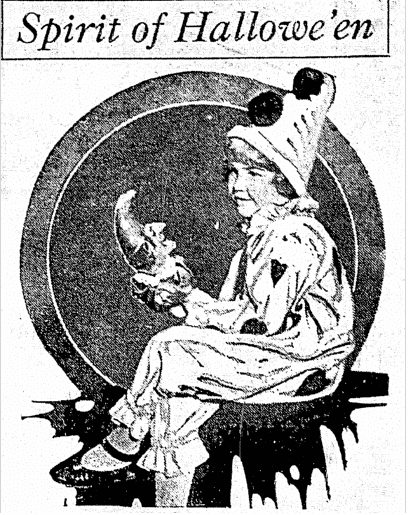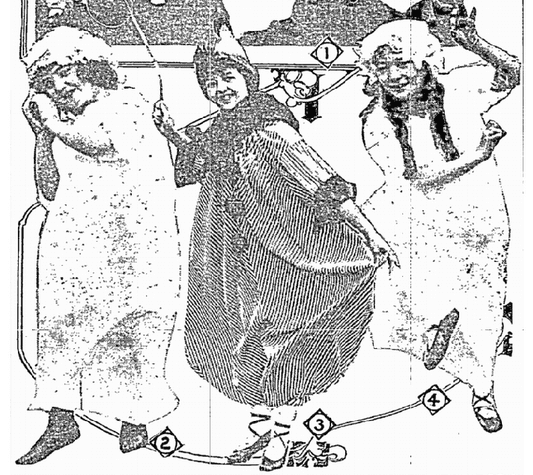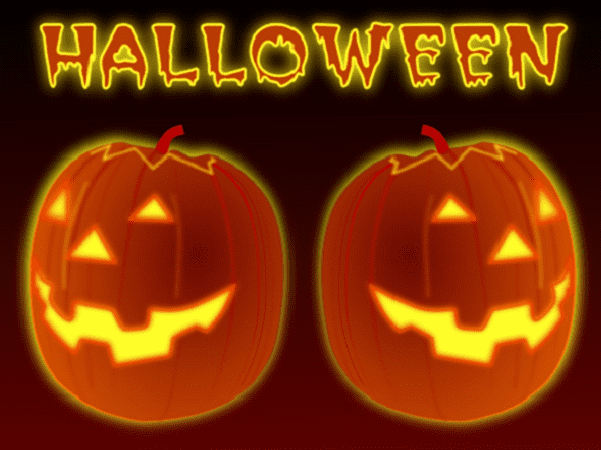Introduction: In this article, Mary Harrell-Sesniak searches old newspapers to find Halloween inspirations from costumes and decorations of yesteryear. Mary is a genealogist, author and editor with a strong technology background.
They say that what once was old, is new again. That may be true in many cases but—judging from photos in historical newspapers—not with Halloween costumes.
To be truly original this year, think about going retro!

If the Halloween fashions that follow don’t unlock your creative spirit, search historical newspapers for your own costume inspirations. There are many, many illustrations of Halloween costumes and holiday decorations of yesteryear.
Search Tip: widen your Halloween search with these variant spellings: Hallow’een, Hallowe’en, Hallow E’en, All Hallow’s Eve, Holly Eve, and Holler Eve.
Early 20th Century Children’s Costumes
The youth of a century ago were often presented in flowing gowns and distinctive hats, some pointy, some ruffled, and some reminiscent of specific eras.

This youngster’s hat is certainly distinctive!
Just as we see today, trick-or-treaters back then imitated characters from popular films. Long before Disney’s “Ariel” or Star War’s “Yoda,” this little girl dressed as the rage of her day: “Sis Hopkins.” She was the pigeon-toed character from Posey County, Indiana, immortalized in Rose Melville’s play. (See advertisement at Wikipedia.)
In 1900, you could attend a matinee performance of the “pastoral comedy hit” for 25 cents in Harrisburg, Pennsylvania—and when Sis Hopkins was first released as a film in 1919, admission was still the same price.
Other Halloween costumes in the early 1900s reflected earlier times in America’s history. Notice how in 1920, Miss Lillian Gallway, a little Texan girl, was outfitted as a “soldierette” of Continental Days. As a genealogist, I would love to see trick-or-treaters knock on my door in outfits like hers.
Classic Women’s Halloween Fashion: Pumpkin Attire
Pumpkins have always been in vogue—even adorning the top of hats and capes. This 1912 image’s caption reads:
“A jack-o’-lantern hat of crepe paper is the latest novelty for wear by the young lady who will attend the Hallowe’en eve festivities. The hat is topped by an imitation jack-o’-lantern and a fan of the same material to match.”
What a grand cape this woman wore in 1915! It was cut from orange-colored material and consisted of a long coat, skirt and pantalets edged with fur or marabou.
Early American Halloween Decorations & Activities
From goblins to witches, the costumes of yesteryear certainly have changed—and not only that, decorations and activities have varied as well. Here is a sampling to help you with this year’s Halloween party planning.
Why not set up a tub for apple bobbing, as these ladies enjoyed in 1903? The caption reads: “Diving for apples in a tub of water—one of the jolliest Halloween games.”
Stencils are always popular, so try applying antique styles, such as these from 1911, to your windows.
This article from 1916 presents ideas for Halloween plans. Pumpkin favors, black cats, chrysanthemum favors and noise makers “for the parade” only cost 10¢.
Old Halloween Customs
Lastly, think about adopting the interpretive customs and activities of your ancestors.
Are you of Scottish ancestry? Did you know they used to burn nuts, thought to be charms, at Halloween? The method of this old custom is described in this newspaper article from 1855.
Perhaps you have Mexican ancestry. This article about “Old Mexico and Hallow ’Een” depicts a Halloween parade and reports that:
“People in the States can not form any adequate idea—save from personal observation—of what ‘Hallow Eve’ means to all classes of Mexicans. For three days and nights commencing on that night of mystery and spells, the entire population completely abandons itself to feasting and frolicking, rejoicing and making merry.”
And if you are truly of early American stock, perhaps you should greet this year’s little goblins and princesses as a Colonial Dame, as recommended in 1913 “for dainty maidens who have been invited to a Halloween party.”
The news article provides these suggestions:
“Any brocaded or flowered material may be used for the pannier, while plain pink or blue or lavender should be used for the underskirt. The hair should be dressed high with curls and powdered, and a long stick with ribbons may be carried to complete this charming effect.”
In lieu of hand-dipped candles, do consider a set of electric candles to adorn your ring lantern. They are a lot less flammable!
Have a good time exploring old newspapers for Halloween inspirations from history. I hope you and your family have a fun Halloween!
